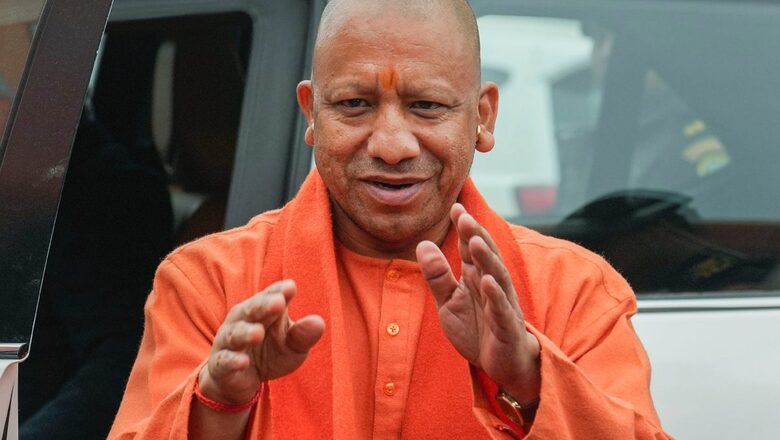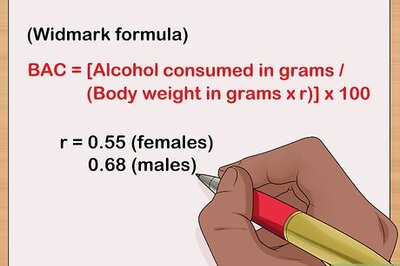
views
Yogi Adityanath is perhaps the first front-ranking BJP functionary from the saffron fold to have officially endorsed Hindu claims over the two contested sites in Kashi and Mathura. The Uttar Pradesh chief minister quoted from the works of the great Ramdhari Singh Dinkar’s poem ‘Krishan Ki Chetavani’ to add temporal ballast to his espousal of the legal fight being waged over the two sites: Mahadev temple in Kashi and Krishna Janambhoomi where records show the Keshavdeva temple was demolished by Islamic invaders in Mathura.
Recollecting the ideological rationale undergirding the twin struggles, CM Yogi said, “Injustice was done to Ayodhya. When I talk about injustice, we remember something that happened 5,000 years ago…For the past many years, (Hindu) society has been talking about only three places. These are special places where our Gods re-incarnated ourselves.”
Invoking the episode from Mahabharata where Duryodhan’s stubborn refusal to cede five villages to the Pandavas led to war, the chief minister added, “Here too, there is rigidity. And when rigidity is laced with politics and efforts are made to turn it into vote-bank politics, then disputes arise.”
Even before the chief minister’s consequential words could sink in, Muslim groups and Opposition parties slammed Yogi Adityanath. They accused him of launching a “communally surcharged ultimatum (to Muslims) underserving of a Chief Minister.” But this characterisation would be a mistake. Yogi’s poetic ode to Kashi and Mathura was not communal. It was a pragmatic, unfeigned or genuine appeal for inter-faith accommodation.
First, Yogi shunned communally vengeful vocabulary preferring much broader civilisational terms. Indeed, Yogi’s stress on Mathura and Kashi is an articulation of a long-standing view held by more intellectual elements of the Hindu right. These elements believe that Ayodhya, Somnath, Mathura and Kashi were targeted only because they were pre-eminent religio-cultural identity markers of Hindus. Historic records exist to prove that Islamic marauders specifically targeted these places of worship to pave over the symbols of Hindu civilisation in an unrequited quest to establish an Islamic redoubt in the subcontinent. An act of injustice never redeemed lawfully. Thus, for many Hindu cultural preservationists, reclaiming these two sites, besides Ayodhya, is an important step toward restoring the Hindu civilisational continuum over Bharat.
Second, Yogi’s remarks signal a major concession to the Muslim community. By committing the BJP to support the demand for the restoration of Hindu claims over just three sites, the Uttar Pradesh chief minister has cleverly pivoted the BJP away from the agenda of the hardline Hindu right. Many of these groups are pledged to “liberate thousands of desecrated Hindu places from the tyranny of Muslim supremacism.” It is easy to see how this “struggle without end” could plunge Bharat into an infinite cycle of recrimination.
Third, Yogi Adityanath has also cannily provided a face-saver to Muslim community leaders. He has done this by placing the blame for “rigidity” on political parties that he claims are intent on communalising the demand for reclamation of mandirs for vote-bank politics.
The Islamo-Leftist ecosystem couldn’t have asked for a better opening to close historical wounds. And Yogi’s once-in-a-lifetime offer guarantees this. Chiefly because handing back the disputed sites in Kashi and Mathura will make it very difficult for saffron incendiaries to perpetually scratch at historical wounds. Denied of a victim card by Muslim magnanimity, any bid by Hindu agitators to further broaden the temple reclamation movement will risk appearing revanchist.
History has shown that Hindus do not reward a lurch towards revisionism and exclusion. Had this not been the case, the BJP would have swept elections in Uttar Pradesh and beyond, soon after the demolition of the Babri Masjid. It was only after the BJP softened the terms of the 1989 Palampur Resolution (this was the first time Ayodhya entered the BJP’s agenda book) and committed itself to finding a lawful solution to the Ram Janmabhoomi dispute that its political acceptability increased.
Muslim elders who have thus far fought against the tide of history, could with a little bit of deliberated beneficence find themselves on the right side of it. Where the gratitude of Nandi and Krishna awaits.
Views expressed in the above piece are personal and solely that of the author. They do not necessarily reflect News18’s views.


















Comments
0 comment